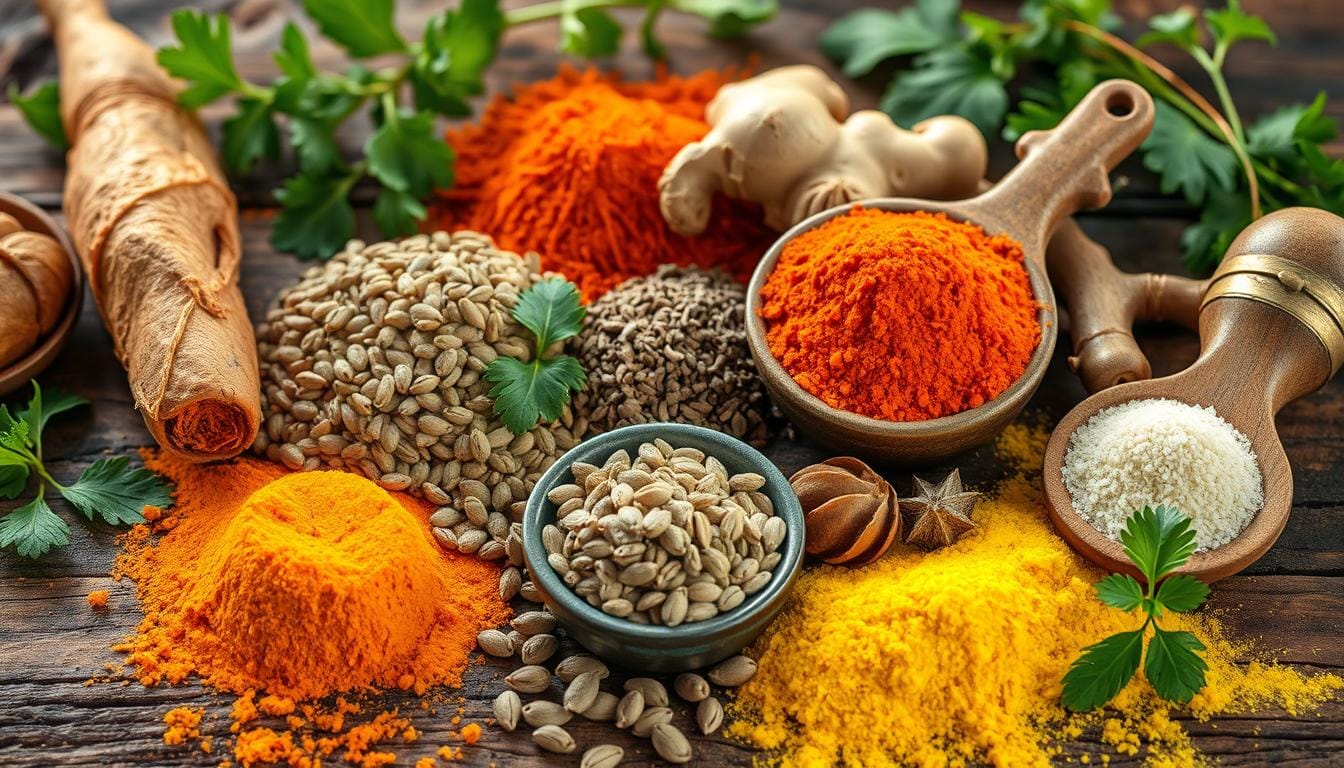Essential Spices for Digestion: Natural Support for Gut Health
Ever thought a simple sprinkle of spices could boost your digestion? As we learn more about gut health, many are looking at natural remedies. Spices for digestion are leading this trend. They not only taste great but also help with digestive enzymes and gut balance.
For centuries, different cultures have used these spices for health. Now, it’s time for them to return to our kitchens. Let’s see how you can add these tasty helpers to your meals for better health.
Key Takeaways
- Spices can enhance digestion and overall gut health.
- Integrating digestive spices into meals can promote better digestion.
- Cultural traditions have long utilized spices for wellness benefits.
- Research supports the effectiveness of specific spices for gut balance.
- Exploring different spices can add flavor and health benefits to your diet.
Introduction to Spices and Digestion
Digestion is key to our health, and the right foods can help a lot. Adding digestive health spices to your diet can make a big difference. These spices have natural properties that aid digestion, making them great for your gut.
Studies show that some spices can ease problems like bloating and stomach pain. They add flavor and offer many health benefits. Knowing how spices help digestion can help you choose better foods for your gut.
Adding digestive health spices to your meals can make food taste better and help your digestion. Using these natural aids can make your meals more enjoyable and improve your health.
The Role of Spices in Digestive Health
Spices are known for their unique flavors and smells. They also help keep our digestive system healthy. Herbs like ginger, turmeric, and cumin are great for digestion. Learning how they work can help us improve our gut health naturally.
How Spices Stimulate Digestion
Some spices make more saliva and stomach juices. These are key for breaking down food. This makes digestion better and helps our body absorb nutrients. Here are some spices that do this:
- Ginger: Encourages digestive enzyme secretion.
- Cumin: Enhances gastric juice production.
- Black pepper: Improves nutrient absorption.
The Science Behind Spices and Gut Health
Studies show how spices affect our gut health. Eating herbs regularly can help good bacteria grow in our intestines. This is good for our digestive system. Table 1 below shows how different spices affect our gut health.
| Spice | Effect on Digestion | Impact on Gut Microbiota |
|---|---|---|
| Ginger | Stimulates enzyme production | Increases beneficial bacteria |
| Tumeric | Reduces inflammation | Enhances gut barrier function |
| Cumin | Improves gastric health | Supports microbial diversity |
Ginger: A Powerful Digestive Aid
Ginger is a top choice for improving digestion. It’s famous for helping with nausea, moving food through the stomach, and easing indigestion. Gingerol, a key compound, is behind these benefits.
Benefits of Ginger for Digestion
Ginger is great for your stomach. People who use ginger often feel better. Here’s why:
- Reduced Nausea: Ginger fights off nausea, from morning sickness to motion sickness.
- Enhanced Digestion: It helps break down food better, cutting down on bloating and gas.
- Soothing Effects: Ginger calms the stomach, making digestion more comfortable.
How to Incorporate Ginger into Your Diet
Adding ginger to your meals is easy and tasty. Here are some ways to do it:
- Ginger Tea: Make a tea with fresh ginger, add honey or lemon for flavor.
- Fresh Ginger in Recipes: Add grated ginger to stir-fries, soups, or marinades for a kick.
- Powdered Ginger: Use powdered ginger in baked goods, smoothies, or curries.

Turmeric: More Than Just Flavor
Turmeric is famous for its bright yellow color and health benefits. Its active compound, curcumin, is key to its health benefits. It’s a natural anti-inflammatory and antioxidant that helps soothe the digestive tract.
Curcumin and Its Effects on Digestion
Studies show that curcumin can reduce gut inflammation. This helps protect against many digestive problems. It improves digestion and supports a healthy gut lining.
Adding turmeric to your meals can boost nutrient absorption. It also reduces digestive discomfort.
Ways to Use Turmeric for Gut Health
It’s simple to add turmeric to your daily meals. Here are some ideas:
- Add turmeric powder to curries and stews for a warm flavor and vibrant color.
- Mix a teaspoon of turmeric into your morning smoothie for a health boost.
- Prepare turmeric tea by infusing fresh or powdered turmeric with hot water and adding honey or lemon for taste.
- Consider turmeric supplements for a concentrated dose, especially if cooking with turmeric is not your preference.
Cumin: A Spice with Multiple Benefits
Cumin is a key digestive spice with many health perks. It adds a unique taste to food and helps with digestion. Studies show it boosts digestive enzymes, easing indigestion symptoms. Adding cumin to your meals can improve your digestion.
How Cumin Aids Digestion
Research backs cumin’s role in better digestion. It boosts digestive enzyme production, key for food breakdown. Its anti-inflammatory effects soothe the digestive system, reducing pain. Eating cumin regularly can make your gut healthier.
Tips for Adding Cumin to Your Meals
It’s easy to add cumin to your cooking. Here are some tips:
- Add cumin to your spice blends for seasoning meats and vegetables.
- Infuse rice dishes with cumin for an aromatic flavor boost.
- Sprinkle ground cumin in soups and stews to enhance taste and health benefits.
- Mix cumin with yogurt or dressings for a flavorful dip or salad topping.
| Dish | Cumin Usage | Health Benefits |
|---|---|---|
| Cumin-Infused Rice | 1 teaspoon ground cumin while cooking | Aids digestion, adds flavor |
| Vegetable Soup | 1/2 teaspoon whole cumin seeds | Enhances gut health, soothes inflammation |
| Meat Marinade | 1 teaspoon ground cumin in marinade | Improves digestion of proteins |
| Spiced Yogurt Dip | 1/2 teaspoon ground cumin | Supports gut flora |
Using cumin in your cooking does more than just add flavor. It also brings health benefits that support your digestive system.
Peppermint: Soothing the Digestive System
Peppermint is a top choice for digestive health because it calms the digestive system. It has a refreshing taste and smell. Studies show it helps with bloating and stomach pain, making digestion easier.
The Calming Effects of Peppermint
Peppermint is great for those who want natural relief from digestive issues. It helps with irritable bowel syndrome (IBS) symptoms like pain and bloating. The menthol in peppermint relaxes muscles, helping the digestive system work better.
Different Forms of Peppermint for Digestive Relief
There are many ways to use peppermint for digestive relief. Here are some popular ones:
- Peppermint tea: A warm cup can be soothing after meals.
- Peppermint essential oil: Used in aromatherapy or mixed with carrier oils for skin use.
- Peppermint capsules: Easy to use for quick digestive support.
Adding these to your daily routine can improve digestion and ease discomfort.

| Form of Peppermint | Benefits | Usage Tips |
|---|---|---|
| Peppermint Tea | Soothes the stomach and alleviates bloating | Brew a cup after meals for effective relief |
| Peppermint Essential Oil | Promotes muscle relaxation in the digestive tract | Inhale or apply diluted oil to the abdomen |
| Peppermint Capsules | Provides targeted relief from IBS symptoms | Take as directed for maximum benefit |
Fennel Seeds: A Natural Remedy
Fennel seeds are a top choice for digestion. They help with bloating and gas. Their carminative effects reduce excess gas, making them key in digestive spices.
Health Benefits of Fennel for Digestion
Adding fennel to your diet can greatly improve digestion. Here are some benefits:
- Reduces bloating and gas buildup
- Stimulates digestion by enhancing enzyme activity
- Relieves symptoms of indigestion
- Acts as an anti-inflammatory agent for the gut
Creative Ways to Use Fennel Seeds
Using fennel seeds in cooking can be fun and healthy. Here are some ideas:
- Fennel tea: Steep one teaspoon of fennel seeds in hot water for 10 minutes to create a soothing tea.
- Salads: Sprinkle toasted fennel seeds on salads for added crunch and flavor.
- Spice blends: Combine fennel with other digestive spices like cumin and coriander to develop vibrant seasoning blends.
| Method | Description | Benefits |
|---|---|---|
| Fennel Tea | Steep fennel seeds in hot water. | Helps reduce bloating. |
| Toasted Fennel | Add toasted seeds to dishes. | Enhances flavor and aids digestion. |
| Spice Blends | Mix with other spices. | Improves digestion and adds variety. |
Fennel seeds offer many health benefits for digestion. They are also fun to use in cooking, making meals more enjoyable.
Coriander: Flavorful and Functional
Coriander is known for its vibrant flavor and is a key spice for digestion. It’s not just good for cooking; it also supports digestive health. The oil in coriander relaxes intestinal muscles, helping with bloating and gas.
The Digestive Benefits of Coriander
This spice is full of benefits for digestion. Coriander can:
- Relax the intestines, easing discomfort.
- Make digestion better, breaking down food well.
- Help the body absorb nutrients better.
Incorporating Coriander into Your Diet
It’s easy to add coriander to your meals. Here are some ways to do it:
- Fresh coriander leaves are great as a garnish for soups, salads, and tacos.
- Ground coriander is perfect for spice blends, marinades, and dressings.
- Coriander seeds can be toasted and added to dishes for a nice aroma.
Coriander is not just tasty; it’s also good for your digestion. Adding it to your meals can make food taste better and help your digestion.
Cinnamon: A Sweet Spice for Gut Health
Cinnamon adds flavor and boosts digestive health. It’s packed with antioxidants that fight gut inflammation and help control blood sugar. This makes cinnamon a key natural aid for digestion and gut health.
Antioxidant Properties of Cinnamon
Cinnamon’s antioxidants shield digestive cells from damage. They reduce inflammation, creating a healthier gut. Adding cinnamon to your meals supports your body’s defenses and improves digestion.
How to Use Cinnamon for Digestion
It’s easy to add cinnamon to your meals. Here are some tasty ways:
- Add cinnamon to your morning oatmeal for a flavorful boost.
- Use it in baking recipes, such as muffins or breads, to enjoy its health benefits.
- Stir cinnamon into herbal teas for a soothing drink that promotes digestion.
| Usage Method | Benefits |
|---|---|
| Oatmeal | Packed with nutrients, oatmeal combined with cinnamon can aid in digestion while offering a comforting breakfast. |
| Baking | The blend of spices not only enhances flavor but may improve gut health with every bite. |
| Herbal Teas | Tea infused with cinnamon creates a calming effect that encourages digestive wellness. |
Regularly using cinnamon in your diet does more than add flavor. It also boosts gut health, making it a tasty way to support your digestive system.
Black Pepper: Enhancing Nutrient Absorption
Black pepper is a top choice for improving digestion. It’s famous for its piperine, which boosts nutrient absorption. Studies show piperine stimulates digestion and boosts digestive enzymes, helping break down food better.
The Role of Piperine in Digestion
Piperine’s special properties make it great for digestive health. It helps the body absorb more nutrients. Adding black pepper to meals can improve digestion and health. This shows why digestive spices are key in our diet.
Tips for Using Black Pepper in Cooking
To get the most from black pepper, follow these tips:
- Use freshly ground black pepper for better taste and health.
- Add it late in cooking to keep its active compounds.
- Combine it with other spices like turmeric or ginger for a strong mix.
- Use it on salads, soups, and roasted veggies to boost flavor.
- Make pepper-infused oil for dressings and marinades.
Learn more about black pepper’s health perks here. Using black pepper right can boost nutrient absorption and offer many health benefits from these spices for digestion.
Conclusion: Spice Up Your Digestive Health
Adding digestive health spices like ginger, turmeric, and peppermint to your meals can really help your digestion. Each spice has its own benefits, like easing nausea and helping your body absorb nutrients better. These spices not only make your food taste great but also help keep your gut healthy. They are key to a balanced diet.
Recap of Digestive Benefits
Many spices can help with digestion by making it better and reducing inflammation. For example, ginger calms the stomach, and turmeric’s curcumin boosts gut health. Spices like cumin and fennel also have benefits. This shows that different flavors can help your digestive system work well.
Encouragement to Experiment with Spices
Don’t be afraid to try new things in the kitchen! Mixing up different digestive health spices can introduce you to new tastes that you’ll love. Try adding cinnamon to your oatmeal or drinking peppermint tea. Even small changes can make a big difference in your gut health. So, get creative and explore the world of spices for better digestion!







